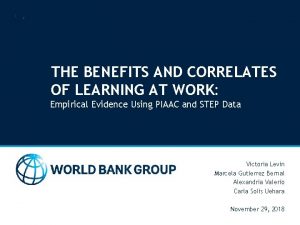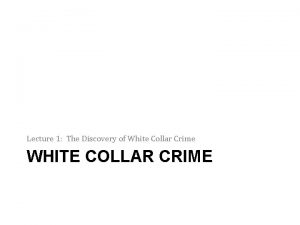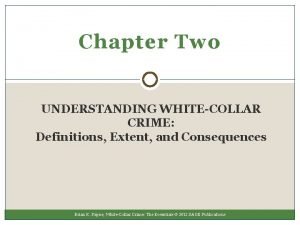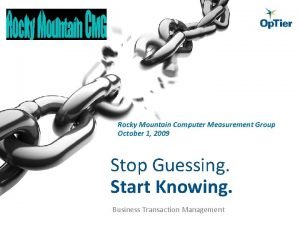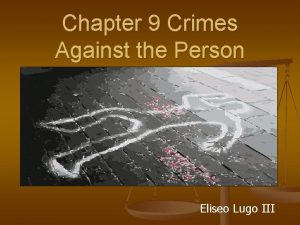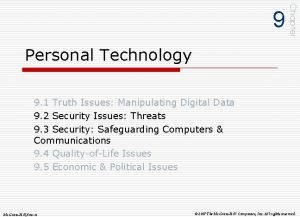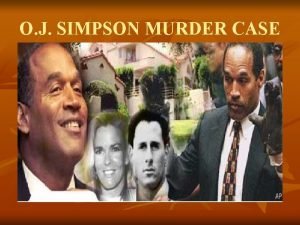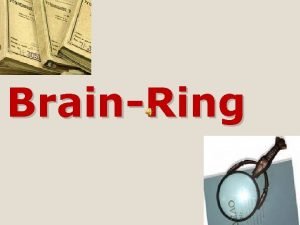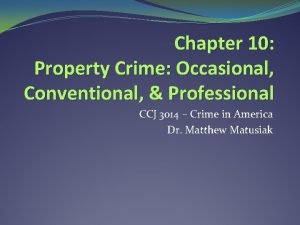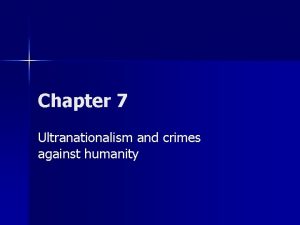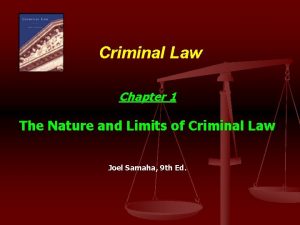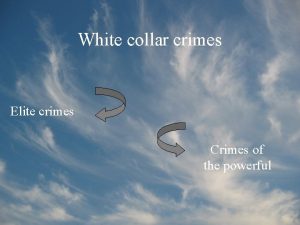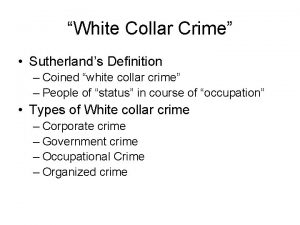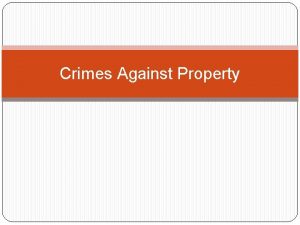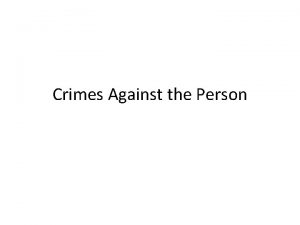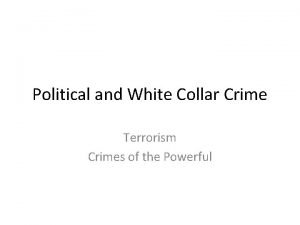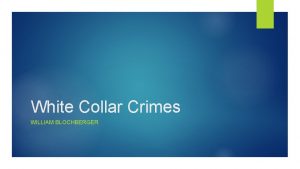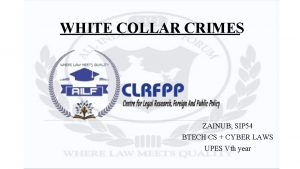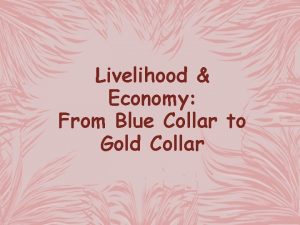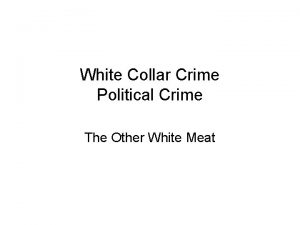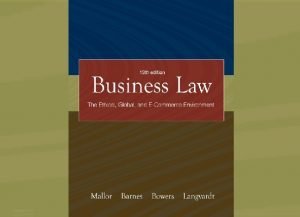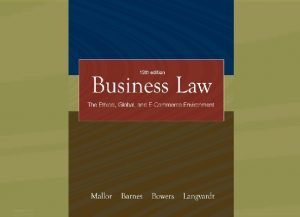White collar crimes White Collar Crimes White collar




















- Slides: 20

White collar crimes

White Collar Crimes "White collar crime" can describe a wide variety of crimes, but they all typically involve crime committed through deceit and motivated by financial gain. The most common white collar crimes are various types of fraud, embezzlement, tax evasion and money laundering. Often thought of as “Victimless” crimes

Fraud is a general type of crime which generally involves deceiving someone for monetary gain. One common type of white collar fraud is securities fraud.

Identity Fraud Using a variety of methods, criminals steal credit card numbers, driver's license numbers, social security numbers, ATM cards, telephone calling cards and other key pieces of individuals' identities. They use this information to impersonate their victims, spending as much money as they can in as short a time as possible. Maximum penalty of 15 years and fines

Securities Fraud Securities Fraud: a person or company (like a stockbroker or brokerage firm) misrepresents information that investors use to make decisions Punishment: Fines range from $10, 000 to $5 million Incarceration in local prison or, if large enough fraud, 5 or more years in federal prison Probation for 5 or more years Restitution: repayment of money lost in crime

Forgery The process of making, adapting, or imitating something with the intent to deceive with the purpose of earning a profit by selling the forged item, or altering public perception. Sentencing The maximum for felony forgery is three years, but varies from case to case. Some may be given probation, depends on the case.

Money Laundering Money laundering is a term used to describe a scheme in which criminals try to disguise the identity, original ownership, and destination of money that they have obtained through criminal conduct. The punishment for this would be rigorous imprisonment from three years to seven years. Example: Illegal gambling, and drug trafficking

Tax Evasion Definition- the illegal nonpayment or underpayment of tax Penalty- A criminal convicted of tax evasion will be guilty of a felony. They will also be imprisoned no more than 5 years Activities include: Underreporting income Inflating deductions or expenses Hiding money Hiding interest in offshore accounts

Cyber Crime Criminal activities carried out by means of computers or the internet Perpetrators can be sentenced no time to 20 years in prison Examples Black market workers Stealing personal information Hacking/Spying Disabling hospitals, banks, and 9 -1 -1 services

Credit Card Fraud Definition: a form of identity theft that involves an unauthorized taking of another’s credit card information for the purpose of charging purchases to the account or removing funds from it Prison Sentence: Minor Offense: Maximum fine of $1, 000 and a sentence of up to 1 year in jail As the value of property received increases, so does the penalty Maximum fine of $25, 000 and a sentence of up to 15 years in jail

Types of white collar crimes Securities Tax Fraud Evasion Money Laundering Identity Fraud

Mob Related Crimes Al Capone Henry John Hill Gotti Mickey Cohen Lucky Luciano Carlo Gambino Frank Costello

In groups of two, you will be researching and creating a brief Power. Point presentations on both a white collar crime (I will assign them), and a mobster/the crimes they commit

Tony “Big Tuna” Accardo came to infamy as a hitman for Al Capone who allegedly participated in the Valentine's Day Massacre. Never convicted of his crimes, Accardo denied any ties to the mob until his death in 1992. CRIME: Hitman: a person who is paid to kill someone, especially for a criminal or political organization.

Mickey Cohen He was born into an Orthodox Jewish family living in the Jewish Brownsville section of Brooklyn. Was a boxer as a teenager Cohen went to Chicago, where he ran a gambling operation for the Chicago Outfit, Al Capone's powerful criminal organization. Crimes: Cohen was convicted of tax evasion and was sentenced to four years in federal prison in 1951.

John Gotti Italian-American gangster who became boss of the Gambino crime family in New York City. Gotti and his brothers grew up in poverty and turned to a life of crime at an early age CRIMES: Hijacking Murder and sentenced to 3 years in prison (1973) Gave Names and Charged with attempted manslaughter and sentenced to 4 years in prison Federal indictments for racketeering (Offering Dishonest Service) Gambling, Drug Trafficking, Extortion, and stock fraud - Life in Prison and then died in the federal prison hospital in 2002

Henry Hill June 11, 1943 - June 12, 2012 Weaseled his way into the mafia Used prison contacts to transfer cocaine from Brooklyn to Pittsburgh CRIME- Drug trafficking - global illicit trade involving the cultivation, manufacture and sale of substances which are subject to drug prohibition laws Made between $15, 000 and $40, 000 a week Book and movie based off of his life called “Goodfella’s” Made $550, 000 Was kicked out of Witness Protection

Al Capone Born in 1899 in Brooklyn, New York American mobster, crime boss, and businessman Most infamous gangster in American History Also involved in prostitution and gambling Responsible for many acts of violence mainly against other gangsters Most famous of these were the St. Valentine’s Day Massacre Finally brought to justice for income tax evasion Illegal underpayment or nonpayment of taxes This is the only thing he was charged with

Frank “The Prime Minister” Costello Tax Evasion a person, organization or corporation intentionally avoids paying his true tax liability Embezzlement theft or misappropriation of funds placed in one's trust or belonging to one's employer. Gambling Enterprise Set up thousands of slots throughout New York Managed bookie operation

Carlo Gambino Crimes Illegal gambling Narcotics trafficking Hijacking: taking over a vehicle and using it for a different purpose than what it was intended Orchestrated Conspiracy murder to commit murder: an agreement between people to commit murder Ran illegal liquor (during prohibition) Hitman: a person hired to kill someone or commit a major crime Abduction and murder
 Blackening and tattooing
Blackening and tattooing White collar crime meaning
White collar crime meaning Dss capabilities
Dss capabilities White and blue collar worker
White and blue collar worker White-collar workers คือ
White-collar workers คือ White collar crime adalah
White collar crime adalah White collar definition
White collar definition Computer measurement group
Computer measurement group Expressive crimes definition
Expressive crimes definition Chapter 9 crimes against the person
Chapter 9 crimes against the person Types of computer crimes
Types of computer crimes Crimes against society
Crimes against society Oj simpson dob
Oj simpson dob Iter criminis
Iter criminis Match the criminal to the crime
Match the criminal to the crime Conventional property crime
Conventional property crime How does ultranationalism lead to crimes against humanity
How does ultranationalism lead to crimes against humanity Types of computer crimes
Types of computer crimes What bones tell us worksheet answers
What bones tell us worksheet answers What are the crimes against public order?
What are the crimes against public order? Crimes contra a economia popular
Crimes contra a economia popular



